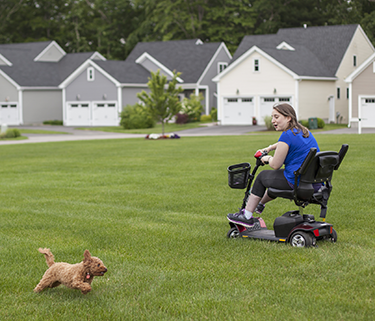The Arc and LSA Form National Collaboration to Support Aging Caregivers and Their Family Members With Disabilities to Plan for the Future
Washington, DC – Lutheran Services in America, Incorporated (LSA), is proud to collaborate with The Arc of the United States’ Center for Future Planning on an initiative to connect older caregivers who support a family member with intellectual and developmental disability to future planning resources.
The Arc has engaged a number of national and state partners to participate in this project including The Arc of North Carolina, The Arc of Tennessee, The National Council on Aging, the Association of Jewish Family & and Children’s Agencies, the University of Illinois in Chicago’s (UIC) Department of Disability and Human Development, and LSA. This one-year project is made possible through a grant to The Arc from The Retirement Research Foundation, a national foundation dedicated to improving the lives of our nation’s elders.
LSA is pleased to engage its member in North Carolina, Lutheran Services Carolinas (LSC), to support the work of this important effort. LSA will work closely with LSC and The Arc to help raise awareness for the future planning needs of aging caregivers in North Carolina and across the country.
According to The Arc, research shows that many aging caregivers are isolated or disconnected from disability services. This initiative will provide training to human services agency staff to conduct in-person outreach to seniors over the age of 65 providing direct support to an adult with intellectual and developmental disabilities; bring information on future planning resources; and encourage caregivers to initiate the future planning process. This collaborative approach among national, state, and local aging, disability, and faith-based human services organizations will leverage the array of resources necessary to reach out to aging caregivers in two states and support them to plan for their family member’s future.
“In our country today, there are nearly one million households with an adult with intellectual and developmental disabilities who is being cared for by someone over the age of 60,” said Charlotte Haberaecker, President and CEO of LSA. “In nearly two-thirds of these families, there is no plan for the future. Through this partnership, we will be able to reach deeper into the communities our human services agencies serve and look for new ways to connect caregivers with the services they need to take the important steps in planning for the ongoing care of their sons and daughters. This project meets a vital need for older adults, especially those who are not connected to the disability community or the social service system.”
“We are excited to work hand-in-hand with The Arc to recruit trainees and help raise awareness about the future planning needs of aging caregivers across our region. Through the relationships we have in our communities and the partners on this project, we will be able to reach senior caregivers more effectively. When you combine our work at LSC with the national scope of the partners on this project, the opportunity to improve the quality of life for caregivers and their adult children has potential to make a real difference in communities across the country.” Ted Goins, President and Chief Executive Officer of LSC.
“The Arc is first and foremost a family organization. We were founded over 65 years ago around a kitchen table by family members who wanted the best life for their loved ones with intellectual and developmental disabilities. Decades have passed and much has changed, but our commitment to supporting families hasn’t wavered.”
“People with disabilities have made great strides to live independently, be a part of their community, and experience all they want in life. But too many people are facing the next chapter in their lives without a plan. Creating a plan for the future isn’t a simple task which is why we want to support caregivers by helping them navigate the systems in place and provide them with every resource we can. We are extremely grateful to The Retirement Research Foundation for funding our work and look forward to working with LSA, an organization that shares our commitment to supporting families,” said Peter Berns, CEO of The Arc.
About LSA: Lutheran Services in America, Incorporated (LSA) is one of the largest health and human services networks in the country with more than 300 members that provide a broad range of critical services from health care to children and family services, senior services, disaster relief, refugee services, disability support, housing, and employment support, among others. Collectively, LSA members serve 1 in 50 people each year in thousands of communities across the United States and are open to all regardless of their religious affiliation or social or economic background. The LSA network is ranked at #23 on the Philanthropy 400, an annual listing of top charitable groups, and has combined revenue of $21 billion. LSA is affiliated with the Evangelical Lutheran Church in America (ELCA) and The Lutheran Church-Missouri Synod (LCMS). To learn more, please visit www.lutheranservices.org.
About The Arc: The Arc advocates for and serves people with intellectual and developmental disabilities (I/DD), including Down syndrome, autism, Fetal Alcohol Spectrum Disorders, cerebral palsy and other diagnoses. The Arc has a network of more than 665 chapters across the country promoting and protecting the human rights of people with I/DD and actively supporting their full inclusion and participation in the community throughout their lifetimes and without regard to diagnosis.



 In June, we celebrate Men’s Health Month and encourage men of all ages with disabilities to learn more about preventable health problems and to practice good health habits.
In June, we celebrate Men’s Health Month and encourage men of all ages with disabilities to learn more about preventable health problems and to practice good health habits. Eighty-five percent of working-age individuals with disabilities are either unemployed or underemployed. Of the 15% that are employed, only half are working in inclusive jobs in the community. Fortunately, new government regulations are focused on changing these grim statistics. A recently proposed rule would require federal agencies to achieve a workforce participation rate of 12% for people with disabilities. One proactive agency, the Federal Communications Commission (FCC), is already leading by example, implementing an initiative dedicated to individuals with disabilities working in competitive and inclusive positions. The Arc’s employment division, The Arc@Work, has been supporting the FCC with their hiring efforts.
Eighty-five percent of working-age individuals with disabilities are either unemployed or underemployed. Of the 15% that are employed, only half are working in inclusive jobs in the community. Fortunately, new government regulations are focused on changing these grim statistics. A recently proposed rule would require federal agencies to achieve a workforce participation rate of 12% for people with disabilities. One proactive agency, the Federal Communications Commission (FCC), is already leading by example, implementing an initiative dedicated to individuals with disabilities working in competitive and inclusive positions. The Arc’s employment division, The Arc@Work, has been supporting the FCC with their hiring efforts. On June 6, 2016, a group of self-advocate leaders met with Gary Owen to discuss offensive content in his
On June 6, 2016, a group of self-advocate leaders met with Gary Owen to discuss offensive content in his 





